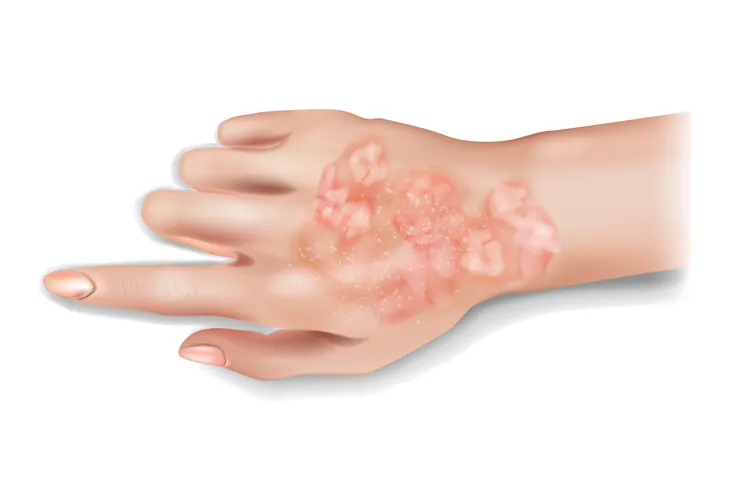If you’re among the 7.5 million psoriasis sufferers in the United States, you’re forced to live day to day with the chronic, inflammatory skin condition that causes skin cells to produce too rapidly. The result is skin marked with red patches or thick, silvery flakes. On top of the disconcerting visual symptoms, the pain, itch, and frustration over the condition can take a deep emotional toll.
That’s why developing a lifestyle plan to ease stress and reduce symptoms as much as possible is important to help manage psoriasis…
Consume a Balanced, Nutritious Diet
The American Academy of Dermatology (AAD) suggests that one of the first steps towards managing chronic psoriasis is to create a healthy, balanced eating plan with the help of your dermatologist. A healthy diet can strengthen the immune system, which will in turn, can guard the body against infections that may exacerbate your skin condition. Also, talk to your doctor before introducing dietary supplements into your diet in the hope to soothe psoriasis symptoms (i.e., ester C or fish oils).
Use Petroleum Jelly
While petroleum jelly works for some psoriasis patients and not for others—the University of Maryland Medical Center claims that moisturizing with it topically has shown some success for lessening the itchy and dry discomfort of psoriasis inflammation and scaling. A thick coating of petroleum jelly (without any harsh chemicals, perfumes, or parabens) applied directly after a short warm bath or shower may help lock in skin’s moisture.
DIY Skin Treatments
Whereas, long, hot baths are unadvisable for psoriasis patients—shorter, lukewarm oatmeal soaks can help ease itch and slough off scaly, flakey skin. Dermatologists at the American Academy of Dermatology suggest soaking in a warm bath infused with fragrance-free bath oils, Epsom salts (or dead sea salts) to ease dryness, scales, and itch.
Resist Scratching
Psoriasis causes inflammation, red patches, and large flaky patches that are difficult not to scratch. If you’re prone to itching and aggravating trouble areas, be proactive by keeping your nails short and resisting the urge to scratch at night by sleeping with gloved hands. Remember, damaging skin can lead to infection.
Pay Close Attention to Triggers
The National Psoriasis Foundation recommends that patients keep a journal to track their psoriasis flare-ups and triggers. For instance, certain weather, foods, times of stress, or medications may spur a psoriasis occurrence. Once you identify your worst triggers, you can do your part to lessen or evade them completely in the future.
Avoid Alcohol
Alcohol is often a trigger for psoriasis patients. In fact, a research study conducted jointly by Harvard Medical School and Brigham and Women’s Hospital found that a mere two to 3 consumed throughout a week worsened psoriasis symptoms, interrupted periods of remission, and lessened the effectiveness of psoriasis treatments.
Reduce Stress
Those who suffer with chronic psoriasis are aware of the emotional stress it can take on your mental health. A University of Pennsylvania study points out that psoriasis sufferers are prone to depression, lowered self-esteem, anxiety, and even thoughts of suicide if they feel they have no control over their condition. This is why seeing a counselor or joining a support group with other psoriasis patients may relieve some stress and help you manage your condition.
Quit Smoking
Of all the reasons to butt out, if you have a family history of psoriasis, or already suffer from the inflammatory skin condition, your reasons are even more convincing. For instance, research published in the American Journal of Epidemiology found that current smokers have double the risk of developing psoriasis (and that includes ex-smokers)—while smoking heightens the severity, decreases remission time, and lessens the effectiveness of treatment in current psoriasis patients.
Develop a Treatment Plan
Always have a plan in place! It’s a good motto, especially if you suffer with psoriasis. Researchers at the University of Minnesota recommend sitting down with your dermatologist to develop a plan of action—for medications, diet, avoiding triggers, managing physical treatments, as well as maintaining emotional health and wellbeing. Establishing a support group of loved ones, medical professionals, and other patients who share your condition can also be of service.












